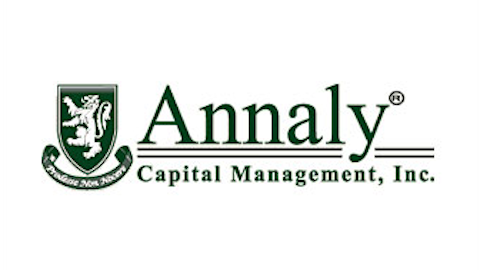Stocks that pay high dividends are becoming favorites among individual investors. Among high yielding stocks, I believe mortgage REITs are the most favored and Arlington Asset Investment Corp (NYSE:AI) is one such high yield stock investors would like to put their money in.
So, let’s review its latest financial disclosures and see whether its dividend yield is sustainable enough to be considered as a potential investment.
Company description

Financials
Arlington Asset Investment Corp (NYSE:AI) announced its second quarter performance recently and surprised investors and analysts. The company reported an earning per share (EPS) of $1.12 per share, beating estimate by $0.04 per share. Compared to prior year, Arlington was able to increase its top line (interest income) by 44%, while the bottom line surged 49% over the same time period. This hybrid nature of the company’s portfolio led Arlington to report a relatively flat book value. This is in contrast to the declines being reported by some of the most followed mortgage REITs.
Dividends
Though the bottom line boost is impressive, mREITs pay out dividends from operating cash flows. So, its important to see whether Arlington Asset Investment Corp (NYSE:AI) has been able to generate operating cash flows that have covered its dividend payments.
The stock is currently offering a dividend yield of 13.6% on a quarterly dividend of $0.88 per share. This quarterly shareholder distribution has been sustained since June 2011. So, when the Fed brought down the long-term rates, Arlington was able to reward its investors at the same rate.
Over the past four quarters (excluding 2Q), Arlington Asset Investment Corp (NYSE:AI) has been able to maintain an average quarterly cash dividend coverage ratio of 0.87 times. This means, the company is generating only 87 cents for every $1 paid in dividends. Over the past three years, this ratio has been at around 0.82 times, which clearly shows that Arlington has not been able to payout its dividends solely through operating cash flows. So, for me the boosts in top and bottom lines are not sufficient if the dividends are not sustained with operating cash flows.
Peer analysis
Let’s look at a few peers of Arlington Asset Investment Corp (NYSE:AI) and how they have been able to cope with the situation during the second quarter.
CYS Investments Inc (NYSE:CYS) is another mortgage REIT that invests in a variety of Agency mortgage backed securities both fixed-rate and adjustable-rate MBS. During the quarter, the company reported a book value decline of 26%, however, at a spread expansion of 20 bps. During the quarter, the company increased its exposure in the 30-year fixed rate security, which I believe became one of the major reasons for this significant book value decline. Also, the company got rid of some of the outperforming 15-year fixed rate MBS.
So, the future for CYS Investments Inc (NYSE:CYS) lies in a re-balancing activity that better suits the prevailing rising interest rates environment. This activity should involve getting rid of some of the 30-year fixed rate Agency paper. This should cap some of the declines in the book value. On the other hand, it could dampen some of the interest income for CYS Investments. To partially offset this, the company should increase its exposure in the 15-year MBS.
For CYS Investments, cash dividend coverage ratio is not appropriate as operating cash flows for the company have remained negative over the past 3 years. So, its obvious that CYS Investments used equity and debt financing to payout its dividends.
Capstead Mortgage Corporation (NYSE:CMO) is another mREIT that has disclosed its performance for the second quarter. The company invests exclusively in adjustable-rate Agency MBS. It’s because of the design and structure of its investment portfolio that Capstead reported only a 5.9% sequential decline in book value. However, the company also reported a 15 bps decline in its net interest spread. I believe the strategy being followed at Capstead is the safest and the most preferred. Adjustable-rate securities provide cushion to book value erosion while providing higher yields as MBS payments adjust to more current rates. Therefore, I am bullish on Capstead Mortgage.
Capstead Mortgage Corporation (NYSE:CMO) maintained a cash dividend coverage ratio of 1.5 times over the last 3 years, which means the company generated 1.5 times more cash from operations than it had to payout in dividends. So, I believe its dividends are sustainable.
Conclusion
We saw how the boost in top and bottom lines is not sufficient for dividend sustainability for Arlington Asset Investment Corp (NYSE:AI). It is not generating enough cash from its regular operations, which is why I believe a dividend cut is around the corner. So, investors should not be fooled by the current yield of 13.6%. Meanwhile, its peer CYS Investments reported a significantly higher decline in its book value and has been supporting its shareholder distributions through equity and debt financing. So, Capstead Mortgage is the most preferred mREIT among the ones being considered in this investment thesis as I believe its dividends are sustainable through its regular operations.
Adnan Khan has no position in any stocks mentioned. The Motley Fool has no position in any of the stocks mentioned. Adnan is a member of The Motley Fool Blog Network — entries represent the personal opinion of the blogger and are not formally edited.
The article Don’t Be Fooled By This 13.6% Yielding Stock originally appeared on Fool.com and is written by Adnan Khan.
Copyright © 1995 – 2013 The Motley Fool, LLC. All rights reserved. The Motley Fool has a disclosure policy.



